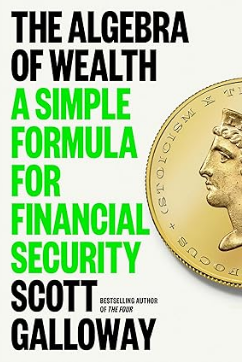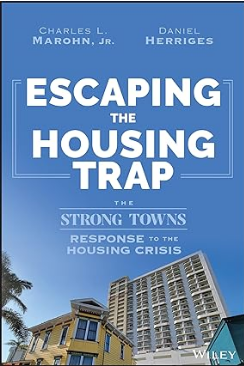
Book Bits: 27 April 2024

By purchasing books through this site, you provide support for The Capital Spectator’s free content… ● Escaping the Housing Trap: The Strong Towns Response to the Housing Crisis Charles L… and Daniel Herriges Summary via publisher (Wiley) Housing is an investment… Housing is shelter… In…
 ● The Algebra of Wealth: A Simple Formula for Financial Security
● The Algebra of Wealth: A Simple Formula for Financial Security
Scott Galloway
Q&A with author via New York magazine
Q: Over the last ten years or so, you had the idea of crypto democratizing finance. Now you have AI democratizing talent, like there’s this hack around wealth and around work.
A: I don’t want to call them get-rich-quick schemes — but the number of people who have made money by buying crypto or buying Nvidia when it was a $10 (now it’s at $800) is small. Even among those few who have managed to do so, a lot give most of it back because they fall under the illusion of thinking it was about skill rather than luck. They double down and start making bigger bets on even riskier assets. The market reminds them in a fairly ugly way that they actually aren’t good. They just got very lucky. I find over the long term, luck is pretty symmetrical. There are people who have made a lot of money in meme stocks; most of them gave it all back because they started conflating luck with talent.
 ● A Wealth of Well-Being: A Holistic Approach to Behavioral Finance
● A Wealth of Well-Being: A Holistic Approach to Behavioral Finance
Meir Statman
Interview with author via Morningstar
Today on the podcast, we welcome back Meir Statman, the behavioral finance expert and author on the connection between financial well-being and life well-being, the role of social comparisons, and more. Meir is the Glenn Klimek Professor of Finance at Santa Clara University. Meir’s latest book is A Wealth of Well-Being: A Holistic Approach to Behavioral Finance. Other books include Behavioral Finance: The Second Generation, What Investors Really Want, and Finance for Normal People. Meir’s research has also been published in the Journal of Finance, the Financial Analyst Journal, the Journal of Portfolio Management, and many other journals. He received his PhD from Columbia University and his BA and MBA from the Hebrew University of Jerusalem.
 ● The Road to Freedom: Economics and the Good Society
● The Road to Freedom: Economics and the Good Society
Joseph E. Stiglitz
Review via The New Yorker
In the early days of the covid-19 pandemic, when there was no vaccine in sight and more than a thousand people who had contracted the virus were dying each day in the United States, Joseph Stiglitz, the economics professor and Nobel laureate, was isolating with his wife at home, on the Upper West Side. Stiglitz, who is now eighty-one, was a high-risk individual, and he followed the government’s guidelines on masking and social distancing scrupulously. Not everyone did, of course, and on the political right there were complaints that the mask mandate, in particular, was an unjustified infringement on individual freedom. Stiglitz strongly disagreed. “I thought it was very clear that this was an example where one person’s freedom is another’s unfreedom,” he told me recently. “Wearing a mask was a very little infringement on one person’s freedom, and not wearing a mask was potentially a large infringement on others.”
It also struck Stiglitz, who had served as chair of the White House Council of Economic Advisers during the Clinton Administration, that the experience of the pandemic could provide an opportunity for a wide-ranging examination of the question of freedom and unfreedom, which he had been thinking about from an economic perspective for many years. The result is a new book, “The Road to Freedom: Economics and the Good Society,” in which he seeks to reclaim the concept of freedom for liberals and progressives. “Freedom is an important value that we do and ought to cherish, but it is more complex and more nuanced than the Right’s invocation,” he writes.
 ● Balance of Power: Central Banks and the Fate of Democracies
● Balance of Power: Central Banks and the Fate of Democracies
Éric Monnet
Review via The Wall Street Journal
The author’s principal theme is the “insufficient democratic accountability of central banks,” and he is of two minds about it. Yes, he allows, the overbearing central-bank money managers “seem to have become omnipotent.” Something must be done; they must bend to the will of the people’s elected officials. But—simultaneously—they must relinquish none of their frequently abused powers.
On the contrary, Mr. Monnet calls on the central banks of Europe and the U.S. to continue in their buttinsky ways: to guard their respective sovereign bond markets against confidence-sapping price depreciation, to lend a hand with the management of climate change, and to keep the welfare state in funds.
 ● Escaping the Housing Trap: The Strong Towns Response to the Housing Crisis
● Escaping the Housing Trap: The Strong Towns Response to the Housing Crisis
Charles L. Marohn Jr. and Daniel Herriges
Summary via publisher (Wiley)
Housing is an investment. Investment prices must go up. Housing is shelter. When the price of shelter goes up, people experience distress. This is the housing trap. It’s time to escape. In Escaping the Housing Trap: The Strong Towns Solution to the Housing Crisis, renowned urbanists Charles (Chuck) Marohn and Daniel Herriges introduce a first-of-its-kind discussion of the tension between housing as a financial product and housing as shelter. This is the key insight that’s been missing from the Housing Crisis Conversation; and the insight that can help cities fight back against the crisis from the bottom-up. This book offers a serious, yet accessible, history of housing policy in the United States and explains how it led us to this point in time: where we face a market that is rigged against people who, only a few decades ago, could have been homeowners or stable, long-term rentals.
 ● Apocalypse Next: The Economics of Global Catastrophic Risks
● Apocalypse Next: The Economics of Global Catastrophic Risks
Stephen Davies
Summary via publisher (Rowman & Littlefield)
The Covid-19 pandemic was, and remains, a global disaster – claiming countless lives and wreaking economic havoc that still reverberates today. But it could have been worse. Much worse. Author Stephen Davies contends the planet ‘dodged a bullet’ this time around. But he warns this was no black swan event: The conflicts in the Ukraine and the Middle East already threaten global stability. And the next existential threat to mankind could happen much sooner than we think – with the chances of it happening increasing exponentially. Here he analyses the potential catastrophes – from nuclear war and climate change to further pandemics, the misuse of Artificial Intelligence and more – that could jeopardise our planet and its people. In this fascinating and at times frightening work, he examines how we assess these risks – and what we can do about them. But Davies is no Jeremiah. He firmly believes the ingenuity, imagination and innovation of millions of people around the world will ultimately secure mankind’s continued existence.
 ● Rich World, Poor World: The Struggle to Escape Poverty
● Rich World, Poor World: The Struggle to Escape Poverty
Ali A. Allawi
Summary via publisher (Yale U. Press)
A landmark history of the world economic order, exploring how developing countries have fought to escape impoverishment. Over the past two decades, experiments in neoliberal economics have opened up a chasm of inequality between the Global South and the West. Development advice from richer nations has led to social upheaval, political unrest, environmental degradation—and even the creation of a new underclass. Brutal extremes of wealth and poverty are now commonplace. Ali A. Allawi traces the evolution of the world economic order from the late imperial era to the present day. Shedding light on continuing controversies, Allawi shows how the process of development has been hindered at every turn, from poor leadership and lost opportunities to widespread corruption. In doing so, he argues that the current neoliberal consensus is only the most recent of a series of failed policy imperatives.
 ● The Everything War: Amazon’s Ruthless Quest to Own the World and Remake Corporate Power
● The Everything War: Amazon’s Ruthless Quest to Own the World and Remake Corporate Power
Dana Mattioli
Interview with author via WBUR
Was Amazon’s success from innovating retail or cornering the market on e-commerce when the internet was still a fringe part of society? Was it by creeping into every part of our daily lives, from shopping to entertainment to health care? Or was it through the iron-fisted leadership and take-no-prisoners attitude of its founder Jeff Bezos? A new book explores all of those questions and more. It’s called “The Everything War: Amazon’s Ruthless Quest to Own the World and Remake Corporate Power.” Author Dana Mattioli, a reporter for the Wall Street Journal, talks about it with Here & Now’s Scott Tong.
Please note that the links to books above are affiliate links with Amazon.com and James Picerno (a.k.a. The Capital Spectator) earns money if you buy one of the titles listed. Also note that you will not pay extra for a book even though it generates revenue for The Capital Spectator. By purchasing books through this site, you provide support for The Capital Spectator’s free content. Thank you!
Author: James Picerno
